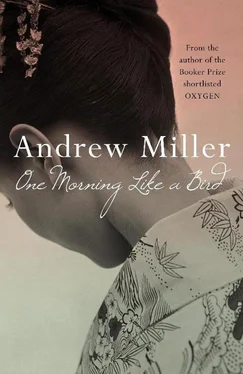‘The electricity is off,’ says Miss Ogilvy. ‘The child was born by candlelight.’
He follows her, her lantern, up a flight of stairs and along the corridor. Nothing waking could have more perfectly the character of a dream. Not just the uncertain light ahead of him, or the dark figure whose shadow is so weirdly thrown on the corridor walls, but the sense that with each step on the worn carpet his old self, like something useless, something used and finished, is falling away, blowing from him like a dust, like fine ashes.
In the room the candles burn in little clusters. Three on the card table, three on the windowsill, five or six on the mantelpiece. All Miss Ogilvy’s girls are there, one of them sitting on Saramago’s expanse of pearl-grey lap. As Yuji arrives, they twitter with excitement, they rustle, then fall silent and turn adoringly to the propped-up figure of Alissa, the dark bundle lying at the opening of her nightgown.
Out of the hush — a hush that seems entirely theatrical — Alissa says, ‘A little boy.’
‘A little boy,’ repeats Yuji. ‘Yes.’ Then, ‘Thank you.’
Saramago erupts with laughter. Miss Ogilvy shoos the girls from the bed, prods Yuji, quite sharply, in the small of the back. He sits on the bed. The baby is wrapped in a towel, its face pressed against one of Alissa’s breasts. It grunts as it sucks, groans like a dreaming dog. The girls, craning over the bed, sigh with pleasure. To Yuji the desperate sucking seems comical, slightly sinister.
‘Look,’ says Alissa, slipping the towel from the baby’s head to reveal a half-dozen luxuriant wisps of slick black hair. Japanese hair? Western hair? Eurasian? With a finger — and how expert she is already, how much the mother — she draws her swollen nipple from the baby’s mouth. ‘Hold him,’ she says. ‘Take him.’
She shows him how to make a cradle of his arms, then leans forward and gently, very gently, rolls the baby from her arms to his. He feels its heat, the restless stretching of its body. There is something oddly dense about the weight of it, as if its life was rolled up tightly inside it like the sticky wing of an insect. It moves its dark-palmed hands, curls its feet, then rolls its face blindly towards his chest. A tip of tongue pokes out, touches the wool of his shirt. The eyes flutter in startlement. The ignorance of it! The utter helplessness! And this is his son? This scrap ? It starts to squall. It becomes rage. Immediately he holds it out to Alissa, feels a moment of awe and resentment at how swiftly her presence soothes it.
Behind him, one of the girls comes in, bottles in her arms, dark green bells of champagne. Saramago opens them. Miss Ogilvy gives Yuji a glass. He turns to Alissa. She taps a fingernail against the rim of his glass. He drinks. Someone opens the window a little. There is the distant droning of an aircraft, of several aircraft. ‘What on earth are they doing flying at this hour?’ asks Miss Ogilvy. After a while the window is shut again.
Chains of coloured paper are hung in swags along the walls of the billiard room. A large Christmas tree is carried in by Yuji and the Chinese houseboy. The girls decorate it with the utmost seriousness. At the top they place a doll, a winged doll, an angel.
There are cards, lanterns — also a little carousel of brass reindeer, their movement powered by the heat of candles. When shown to the baby, he throws back his arms and squawks with excitement, though shown it a second time he seems indifferent.
He’s too intelligent for such a toy,’ says Feneon, grandly. ‘Already he has escaped from Plato’s cave.’
‘What nonsense you talk,’ says Miss Ogilvy, sponging a smear of regurgitated milk from the Frenchman’s lapel.
In the six days since the birth Feneon has been a regular caller at the academy. The girls all seem to know him well, treat him like an indulgent father, are openly amused by Miss Ogilvy’s rudeness to him.
To Yuji, Feneon has offered — with an ironic cocking of an eyebrow — his felicitations on the birth of a healthy son. If he is still angry with Yuji, he hides it well enough for them to speak to each other in civil tones, and for now at least the baby heals everything, distracts everyone, creates, in every room it lies in, a feeling of reverence, of incontinent hope.
At Miss Ogilvy’s suggestion, Alissa and Yuji have named the child Emile. It would, she assured them, appeal to Feneon’s vanity, it would mollify him, and though, on learning of it, Feneon protested, his delight was obvious. Emile. Baby Emile. Little Emile. When not in his mother’s arms or on Feneon’s knee, he is passed among the girls. Yuji, too, takes his turn, reluctantly at first, unable to free himself from the paralysing fear of dropping him, but as he grows in confidence he finds himself falling under the same fascination the others surrendered themselves to so eagerly. Shyly, then openly, he dots the child’s brow with kisses, inhales the bready, powdery, new-animal scent of the warm black hair. At home, he notices his clothes have started to smell of the baby. Can anyone else smell it? His neighbours? Miyo?
‘I presume your parents know nothing of all this,’ says Feneon one evening, as they ride an empty carriage back into Tokyo together. ‘The longer you leave it, the more difficult it will become. The more painful for them.’
Is he speaking from experience? How, Yuji would like to ask (and only in part to embarrass him), did you tell your parents about Alissa? Or were the thousands of miles between Sézanne and Saigon sufficient for the secret of a child, a lost mother, to be kept for ever? As for his own parents, what in his past dealings with them can reliably tell him how they will respond to the news of a bastard, half-caste grandson? Certainly he knows of cases where a son or daughter has been formally renounced, and for behaviour, for acts, far milder than his own might appear.
On the morning of Christmas Eve he tells Miyo he will be away for the night. He leaves her money to go to the New Year markets. He will be in Yokohama. She should go to the Otakis if she needs help. She nods. She does not ask him any questions, though there is something in the way she looks at him that makes it clear she has reached her own conclusion about nights away in Yokohama.
At midnight in the Bullseye Piano Academy the last visitors are guided — or waltzed, in the case of one beaming, red-faced old gentleman, the under-secretary of something — to the front door. The last taxi pulls away. The glasses and ashtrays and empty bottles of Monopole and Hennessy are carried to the kitchen.
When everything is in good order again, when the fire has been fed and poked into fresh life, they gather on the rug or draw up chairs, their palms held out to the flames. Emile is sprawled asleep on a blanket by Alissa’s feet. Yuji kneels beside him. Natasha plays the guitar. They sing Christmas songs, Christmas carols. Most of these Yuji has never heard before, but one, ‘ Stille Nacht, Heilige Nacht ’, is familiar to him. Mother — who must have been taught it by Grandfather Yakumo — used to sing it when he and Ryuichi were little boys, and because he has only ever heard it in her voice, he has always thought of it as somehow being a Japanese song, though now the foreigners are singing it, half joyfully, half sadly, he sees that it’s theirs, that it comes out of their world.
After the singing, Feneon and Miss Ogilvy bring in the parcels that have lain so enticingly for days on the table in the back dining room. They spread them by the bottom of the tree. Rose — the youngest after Emile — reads out the names, reads out the doggerel that accompanies some of the names, and hands the parcel (with some ceremony, some giggling) to the recipient. Everybody has something. There are perfume bottles, ribbons, brooches, silken underwear. Alissa has a hat with a fox-fur brim, Yuji a tie with jagged orange stripes (a jazz tie!). For Emile, there are wooden toys and toys of tin, a pair of lamb’s-wool booties, a Chinese-style jacket hardly bigger than a man’s handkerchief.
Читать дальше












